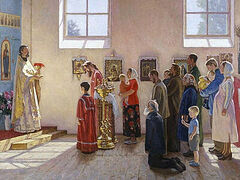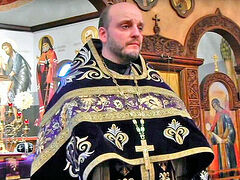We often hear how some people complain that they are unable to find their place at such and such church, and they neither fit in the established parish nor feel at ease there… What should they do?
To begin with, let’s try to understand: what is behind the drive to become a part of it?
To be on friendly terms with a priest? More often than not, yes.
Being a priest’s buddy
A close friendship between parishioners and the clergy has never been conducive to spiritual growth
Even if more than enough has been said about it, we will have to reiterate it once more because of the relative frequency of temptations of this nature: Being close friends with the clergy was never conducive to the parishioners’ spiritual growth. Quite the opposite.
Why would we need to be on friendly terms with a priest? Is it because we want to learn more about the Orthodox faith? Well, but our best bet for learning it is to follow the commandments and read rigorously, as well as ask for the priest’s reading list suggestions during confessions. You’ve got to read and try your best to put what you have read into practice while also asking the comprehensive questions that come up as a result of your reading, but first conceptualizing and then adding them within the context of your confession… And later you have to go back and read more using the advice received during the confession—that’s the best available method of getting acquainted with matters of faith.
“It doesn’t work that way?” Well, then it means you either haven’t met “your kind” of a priest or you didn’t work hard enough to grasp what you have learned already.
If a priest isn’t “the kind that you need,” any friendly relationship with him will do no good. If on top of that, you don’t work hard enough, no friendly sit-downs or intimate chats will ever be helpful for you. True, you may feel good as if you gained something as a result of it… but this perception will be false.
Subordination
Apart from the above, a priest is in the position of an elder before a layman at church, and being on familiar terms with an authority figure is oftentimes a test not everyone can pass. Abba Barsanuphius told Abba Dorotheus outright that only a few can benefit from being on friendly terms with the abbot.
It largely depends not only on personal virtues but also on one’s state of mind and upbringing, in particular. The ability to build relationships properly is a whole new field of cultural behavior that many of us were sadly deprived of from birth.
In the majority of cases, we are incapable of solving even simplest problems in this area. For example, how to deal with a feeling of being a part of the “Imperial retinue.” Or, how to how to tell the difference between situations when we should support someone, or when that person not only has the right but the duty to lecture us—that is, to convince, rebuke, exhort, with all longsuffering and teaching (2 Tim. 4:2).
So, when someone fails to understand these basic rules and becomes friends with a clergyman, the latter, for one thing, is no longer able to influence the former’s spiritual growth. Soon the situation becomes intolerable as it is further complicated by judging. This happens when someone gets to know a clergyman intimately; he can’t perceive the real value of his personality and, upon close contact, bumps into all kinds of human weaknesses and limitations.
Kindred spirits
But what if someone is seeking friends among other parishioners, and not the priests?
That is understandable; people are social beings, it is part of our inner nature created in the image and likeness of the Holy Trinity, and so we strive to live among like-minded people. Whenever we lack a circle of kindred spirits, we yearn for it.
So why can’t we build these friendships?
By chasing positive human relationships, we generally tend to forget about God
If we are talking about a healthy community of the faithful, there are the following reasons.
People in general and novices in particular tend to forget about God when chasing positive human relationships. Then God, teaching us a lesson, permits us to be alone.
We also tend to forget that a circle of friends and kindred souls isn’t a consolation that can be taken for granted but great mercy of God. This delusion is also treated with loneliness.
 Photo: pomog.org But the most important thing is that it’s impossible to find like-mindedness among people if they are far busier than us and we don’t even perceive it. If are talking about a well-functioning church community, its members are most likely very involved in a busy, and often overly busy, parish life. For one thing, they attend services, help in the altar, read/sing in a church choir (or learn singing and chanting), assist with cleaning chores, and decorate the church for the feasts. They also teach at a Sunday school, take part in men’s groups or sisterhoods, as well as participate in the activities organized by various clubs. They may also be responsible for holding sports events, children’s parties, parish picnics or arranging summer camp trips…
Photo: pomog.org But the most important thing is that it’s impossible to find like-mindedness among people if they are far busier than us and we don’t even perceive it. If are talking about a well-functioning church community, its members are most likely very involved in a busy, and often overly busy, parish life. For one thing, they attend services, help in the altar, read/sing in a church choir (or learn singing and chanting), assist with cleaning chores, and decorate the church for the feasts. They also teach at a Sunday school, take part in men’s groups or sisterhoods, as well as participate in the activities organized by various clubs. They may also be responsible for holding sports events, children’s parties, parish picnics or arranging summer camp trips…
Others are busy at social volunteer work: They visit the shut-ins and the handicapped, the elderly, or those in prisons; they could be involved in the church media outreach programs... You name it. And along with all this, they usually have day jobs and busy families.
All a newcomer sees is that everyone goes off to have tea, but he isn’t invited. Even if he was invited, what would they talk about with him? Those who worked hard and feel exhausted as a result of it will sit down to drink tea differently from those who came in to have a chat with nice people.
Common cause
This is the translation of the word “Liturgy.” The life of a church parish stems from the fact that during the Liturgy the congregation experiences a wholesome sense of belonging to the Church, the One and Undivided Body of Christ. What does Apostle Paul consider as equally relating to all members of the Church (Romans 12)? Sure, everyone is involved differently but all members of the Church must exert themselves, albeit in their respective positions.
But we began our conversation by saying that a newcomer often feels out of place…
Yet, there is a place for them! But they can’t see it. It often happens that they are looking for it in all the wrong places, or maybe they are focused on the wrong goals. I remember that Pravoslavie.ru once talked about the use of stereograms (in an article called “Missionary method”), and the same goes for our case, when newcomers to a church should look at life there from a different angle.
But from what angle?
For us as Christians, serving others must become the key element of our Christian deed
The Lord didn’t come to be served but to serve! For us as Christians, serving others must become the key element of our Christian work.
It is only natural that the majority of people, as soon they come to faith, are unable to take upon themselves a heavy service load, given their inexperience as Christians. It is also beyond their reach due to old age, sickness, the burden of a large family or a busy job, etc.
However, anyone who is already busy conducting an important mission at church will be happy to get help! What if you can’t take a big load of service upon yourself? Begin by providing help where possible to someone who can.
Ahh, it’s not your piece of cake? Well, that’s another topic of discussion.
Why do we feel unappreciated at times as church helpers?
There are usually four specific reasons for this.
Firstly, we sometimes tend to intimidate others with our sense of purpose. We don’t insist upon it but it does happen that we frequently demand attention in return for our help.
It’s true though that we can understand it when someone who does a lot then asks for a bit of attention in place of encouragement. But what should we do if our help is negligible, but we demand that we or our opinion are held in high regard? Then, there are telling cases when people consciously and explicitly let others down, thinking, “Aha, try to do it without me now!” Any authority figure (be it a rector or an archpastor) who has grappled with such a problem a few times will come to think they it would be better to have no help at all…
Performing a task is only a small fraction of the job, since what matters most is safeguarding peace while doing it
Secondly, if we are capricious and defiant, if we argue or dispute against every word, no one will be happy to get help from us. Clearly, every job can be done differently and obviously, some ways or methods of doing it are far more effective than others… But Abba Dorotheus said that to perform a task is only a small fraction of the job since what matters most is safeguarding peace while doing it. Even if everyone is seemingly at peace with one another, a defiant helpers sap so much strength from the one in charge that he ends up saying: “I wish I had done it all by myself!”
A third category of least-favored helpers belongs to those super-charged idea generators, who happily make others responsible for bringing their ideas to fruition. Something like, “Give me a couple of helpers and I will do it all myself!” Or even worse: “I had such a great idea, but the rector killed it!”
At a closer look it turns out that the wonderful idea is quite fantastic, but the person sincerely believes that if only everyone had listened to him it would have all come together by itself, and we’d have Springtime and the Triumph of Orthodoxy in December.
And lastly, there is another reason—a banal one, when someone simply doesn’t know how to behave. It tires some people more than others if we act tactlessly, improperly, or show bad manners. Or, if we aren’t willing to admit we have a problem and instead of saying “I am sorry, I’ll try to do better next time!” we say theatrically: “I’m just an ordinary guy!” In such cases, our prospects for service to the Church may be postponed to the unforeseeable future…
To be continued…





